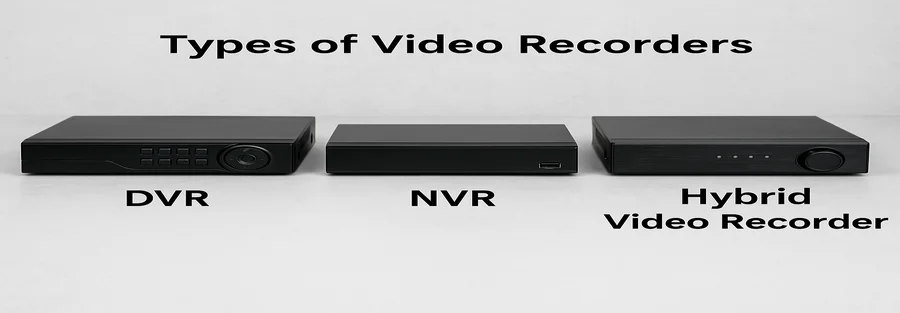In an age of heightened awareness around safety, the demand for reliable security camera recording system solutions is growing rapidly. Whether for corporate offices, retail spaces, warehouses, or residential complexes, video surveillance has become essential.
Choosing the right security camera recording system can mean the difference between effective deterrence and a costly security breach. One of the most fundamental decisions is selecting between the different types of video recorders available—each serving unique purposes based on camera compatibility, scalability, and remote accessibility.
This blog explores various types of video recorders, including DVRs, NVRs, and hybrid models, and highlights the differences in the hotly debated DVR vs NVR discussion.
Table of Contents
ToggleWhat Are Video Recorders in CCTV?
Video recorders are the backbone of a CCTV video surveillance setup. They store footage captured by cameras and offer a centralized platform to view, manage, and analyze surveillance data.
Understanding the different types of video recorders is vital because they directly impact:
- Storage capacity and video retention
- Video resolution and clarity
- Scalability for future expansion
- Integration with other systems like alarms and analytics
Common Types of Video Recorders
- DVR (Digital Video Recorder): Works with analog cameras.
- NVR (Network Video Recorder): Compatible with IP (Internet Protocol) cameras.
- Hybrid Recorders: Support both analog and IP cameras, ideal for transition phases.
DVR vs NVR: Key Differences
The DVR vs NVR debate often boils down to architecture, cost, and use case. Below is a comprehensive comparison:
| Feature | DVR | NVR |
| Camera Type | Analog Cameras | IP Cameras |
| Connectivity | Coaxial Cables | Ethernet Cables (PoE) |
| Video Processing | At the Recorder | At the Camera |
| Scalability | Limited | Highly Scalable |
| Video Quality | Lower | High-definition |
| Remote Access | Manual Setup Required | Cloud-ready, easier setup |
| Cost | More Affordable | Slightly Higher Initial Investment |
The DVR vs NVR comparison shows that while DVRs are cost-effective, network video recorders offer superior performance, making them the modern preference.
Spotlight on NVRs: The Modern Choice
Network video recorders have become the gold standard in modern surveillance due to their compatibility with advanced IP cameras and their feature-rich architecture.
Why Businesses Prefer NVRs:
- Supports HD and 4K Video: NVRs process video at the camera level, ensuring minimal quality loss.
- Cloud Integration: Easy remote access via apps or web platforms.
- AI Integration: Compatible with human detection, license plate recognition, and facial recognition.
- Scalability: Add or remove cameras without major rewiring.
Network video recorders are often the preferred choice in enterprise-level security and smart buildings due to their flexibility, future-proof design, and support for intelligent analytics.
Hybrid Systems: Best of Both Worlds?
Hybrid video recorders combine the analog and IP recording technologies, allowing businesses to use both analog and IP cameras within the same system.
Benefits of Hybrid Systems:
- Cost-effective Transition: Use existing analog infrastructure while gradually upgrading to IP.
- Scalability: Add newer features without scrapping legacy systems.
- Ideal for Multi-location Setups: Especially where a mix of old and new systems coexist.
These systems help bridge the gap during the transition from DVR to network video recorder setups, reducing upfront investment while modernizing over time.
How to Choose the Right Security Camera Recording System
Choosing the right security camera recording system depends on multiple factors:
- Number of Cameras: DVRs suit small setups; network video recorders are better for large-scale.
- Remote Access Needs: NVRs support cloud monitoring and mobile apps.
- Budget: DVRs offer low-cost setups; NVRs and hybrids offer long-term ROI.
- AI Capabilities: Businesses seeking intelligent surveillance need NVR or hybrid setups.
- Upgrade Path: If you’re planning a phased upgrade, hybrid systems might be ideal.
🔹 Pro Tip: Don’t just choose based on cost—consider service, uptime, and after-sales support.
That’s where Securens comes in. As a nationally awarded E-surveillance company, we provide industry-leading solutions that go beyond traditional video recorders. Our systems like ACTiCARE and ACTiAUDIT have helped brands like Kama Ayurveda and Agarwal Packers gain total control of their surveillance infrastructure.
Conclusion
Understanding the various types of video recorders—DVRs, NVRs, and hybrids—is essential to setting up a robust surveillance system. While the DVR vs NVR conversation is central, the right choice hinges on your current setup, budget, and long-term needs.
With modern threats becoming increasingly sophisticated, investing in a powerful, AI-ready network video recorder can offer unmatched value and peace of mind.
Looking for expert advice? Contact the Securens team today and let us help you build a future-ready security camera recording system that fits your business like a glove.



